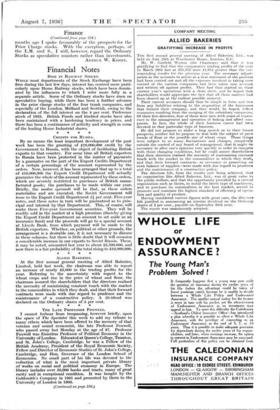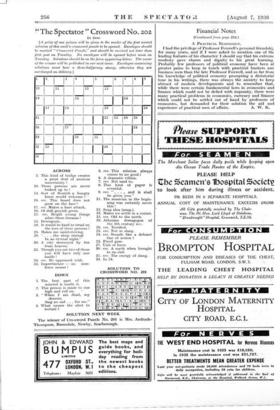Financial Notes
RISE IN RAILWAY STOCKS.
WHILE most departments of the Stock Exchange have been firm during the last few days, interest has centred more parti- cularly upon Home Railway stocks, which have been domin- ated by the influences to which I refer more fully in a separate article. Some of the Ordinary stocks have risen on speculative buying, while there has been a further advance in the prior charge stocks of the four trunk companies, and especially of the London, Midland and Scottish, owing to the declaration of the full interest on the 4 per cent. Preference stock of 1923. British Funds and kindred stocks have also been maintained with a hardening tendency in prices, and there has been a continuance of activity and strength in some of the leading Home Industrial shares.
* * * * CREDITS FOR RUSSIA.
By no means the least important development of the past week has been the granting of £10,000,000 credit by the Government to Russia, with the object of facilitating British exports to that country. For some time all British exporters to Russia have been protected in the matter of payments by a guarantee on the part of the Export Credits Department of a certain percentage of the amount represented by the orders. Now, however, it has been arranged that up to a total of £10,000,000 the Export Credit Department will actually guarantee the whole of the amount represented by these orders, which are severely restricted to purchases of British manu- factured goods; the purchases to be made within one year. Briefly, the modus operandi will be that, as these orders materialise and are executed, the Soviet Government will issue to the Export Credit Department 54 per cent. Five-year notes, and these notes in turn will be guaranteed as to prin- cipal and interest by that Department. This, of course, will make them Five-year Government securities. They will be readily sold in the market at a high premium (thereby giving the Export Credit Department an amount to set aside as an insurance fund) and the proceeds will go to a special account at Lloyds Bank, from which payment will be made to the British exporters. Whether, on political or other grounds, the arrangement is a desirable one, it is not necessary to discuss in these columns, but there is little doubt that it will occasion a considerable increase in our exports to Soviet Russia. These, it may be noted, amounted last year to about £3,500,000, and now there is a fair probability of the total rising to £10,000,000.
* * *
ALLIED BAKERIES.
At the first annual general meeting of Allied Bakeries, Limited, held last week, the chairman was able to report an increase of nearly £2,000 in the trading profits for the year. Referring to- the uncertainty with regard .to the wheat crops and rise in the price of wheat and flour, the chairman assured the shareholders that the directors realised the necessity of maintaining constant touch with the market in the commodities in which they dealt, and that their forward contracts were made with due regard to prudence and the maintenance of a constructive policy. A dividend was declared on the Ordinary shares of 3 per cent. * * * *
THE LATE PROFESSOR FOXWELL.
I cannot forbear from trespassing, however briefly, upon the space of The Spectator this week to add my tribute to many others which have been offered to the memory of that veteran and sound economist, the late Professor Foxwell, who passed away last Monday at the age of 87. Professor Foxwell was Emeritus Professor of Political Economy in the University of London. Educated at Queen's College, Taunton, and St. John's College, Cambridge, he was a Fellow of the British Academy; President of the Royal Economic Society, Fellow and Director of Economic Studies of St. John's College, Cambridge, and Hon. Governor of the London School of Economics. No small part of his life was devoted to the collection of what is the most important private library of works on social and political economy in Europe. The library includes over 50,000 books and tracts, many of great rarity and in exceptional condition. It was bought by the Goldsmith's Company in 1901 and presented by them to the University of London in 1903.
(Continued on page 256.)
Financial Notes
(Continued from page -255.) A PRACTICAL ECONOMIST.
I had the privilege of Professor Foxwell's personal friendshii for many years, and if I were asked to mention one of tin leading features of his character I should say that his extreme modesty gave charm and dignity to his great learning, Probably few professors of. political economy have been al greater pains to keep in touch with practical bankers and business men than the late Professoi Foxwell, and so far from his knowledge of political economy prompting a dictatorial tone in his writings, there was always the anxiety to keep abreast of modern developments and to remember that, while there were certain fundamental lain in economics and finance which could not be defied with inipimity, there were many practical problems in economics, currency and fithince which could not be settled out of hand by professors of economics, but demanded for their Solution the aid and
experience of practical men of affairs. - A. W. K.







































 Previous page
Previous page